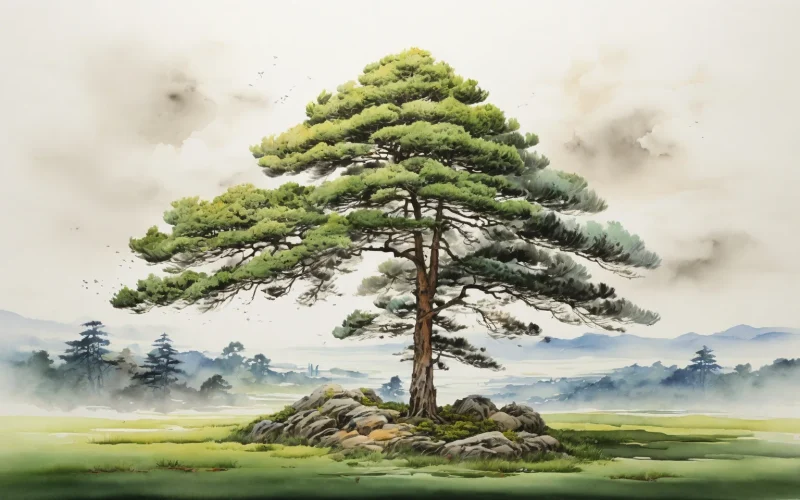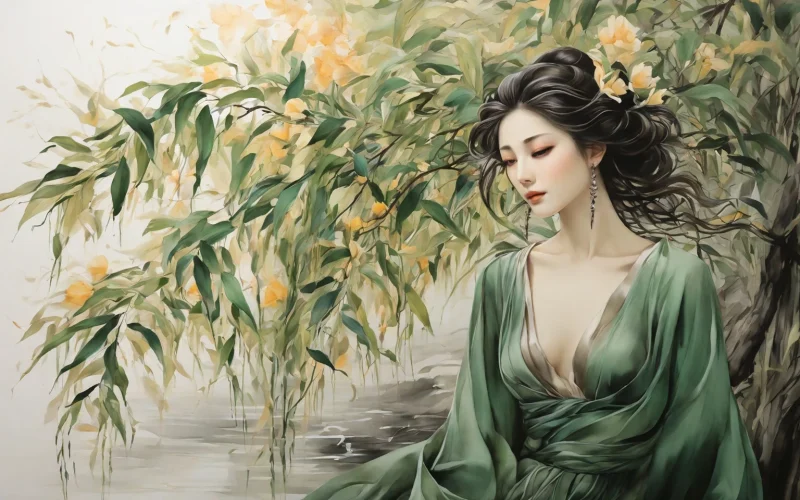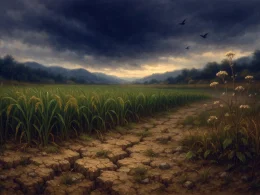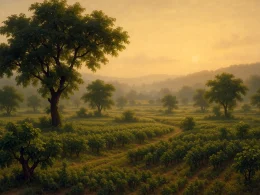While young, the pine tree thrusts its head amid tall grass;
Now by and by we find it outgrow weed in mass.
People don't realize it will grow to scrape the sky;
Seeing it tower in cloud, then they know it's high.
Original Poem
「小松」
杜荀鹤
自小刺头深草里,而今渐觉出蓬蒿。
时人不识凌云木,直待凌云始道高。
Interpretation
"The Young Pine" was written during the late Tang Dynasty, a period marked by social unrest and political corruption. Many talented individuals, due to their humble origins or lack of opportunities, struggled to gain recognition. Du Xunhe, the poet, came from a modest background and repeatedly failed the imperial examinations, facing a difficult career path. Through this poem about a young pine tree, Du Xunhe expresses his frustration at being unrecognized and critiques the unfairness of a society that fails to appreciate talent.
First Couplet: "自小刺头深草里。"
Zì xiǎo cì tóu shēn cǎo lǐ.
From a young age, the pine's sharp needles grow amidst the deep grass.
The poet uses the image of the pine's "sharp needles" (刺头) to symbolize the resilience and determination of talented individuals from humble beginnings. Despite being surrounded and overshadowed by tall grass, the young pine stands out, representing those who, despite their difficult circumstances, exhibit exceptional character and potential.
Second Couplet: "而今渐觉出蓬蒿。"
Ér jīn jiàn jué chū pénghāo.
Now, it gradually rises above the tall weeds.
This couplet describes the pine's growth and its eventual emergence from the surrounding weeds. The phrase "gradually rises" (渐觉出) suggests that growth and success are not instantaneous but the result of persistent effort and accumulation of strength. The pine's progress symbolizes the gradual recognition of talent that has been nurtured over time.
Third Couplet: "时人不识凌云木。"
Shí rén bù shí líng yún mù.
People fail to recognize the tree that will one day reach the clouds.
Here, the poet criticizes society's short-sightedness. The pine, destined to grow into a towering tree, is overlooked in its youth. This line reflects the poet's frustration with a society that often fails to recognize potential until it has already been realized, leaving many talented individuals unnoticed and unappreciated.
Fourth Couplet: "直待凌云始道高。"
Zhí dài líng yún shǐ dào gāo.
Only when it reaches the clouds do people praise its height.
In the final couplet, the poet highlights the irony of societal recognition. People only appreciate the pine's greatness once it has already achieved prominence, failing to support or recognize its potential during its early growth. This critique underscores the poet's frustration with a society that values results over potential and fails to nurture talent in its formative stages.
Overall Appreciation
This poem uses the metaphor of a young pine tree to explore themes of unrecognized talent and societal injustice.
The first couplet introduces the pine's resilience, symbolizing the determination of talented individuals from humble beginnings. Despite being overshadowed, the pine's sharp needles signify its unique potential.
The second couplet describes the pine's gradual growth and emergence from the weeds, symbolizing the slow but steady progress of those who persist in developing their talents.
The third couplet critiques society's failure to recognize potential, as the pine's future greatness goes unnoticed in its youth. This reflects the poet's own experience of being overlooked despite his talents.
The final couplet emphasizes the irony of societal recognition, as people only praise the pine once it has already achieved greatness. This critique highlights the poet's frustration with a society that values results over potential and fails to support talent in its early stages.
The poem's strength lies in its ability to blend vivid imagery with deep emotional resonance. Through the metaphor of the pine, Du Xunhe conveys his own frustrations and critiques societal injustices, creating a powerful and lasting impression.
Writing Characteristics
- Metaphor and Symbolism
The poem uses the young pine as a metaphor for unrecognized talent, symbolizing resilience, growth, and potential. - Critique of Society
The poem critiques societal short-sightedness and the failure to recognize and nurture talent in its early stages. - Gradual Progression
The pine's gradual growth symbolizes the slow but steady progress of those who persist in developing their talents, emphasizing the importance of patience and perseverance.
Insights
This poem offers a profound meditation on the challenges faced by unrecognized talent and the importance of societal support. Through the metaphor of the young pine, Du Xunhe highlights the resilience and determination required to overcome obstacles and achieve greatness.
The poem also serves as a critique of societal values, challenging us to recognize and nurture potential in its early stages rather than waiting for it to be fully realized. It reminds us of the importance of supporting and encouraging those who show promise, even if their talents are not yet fully developed.
Ultimately, "The Young Pine" is a meditation on resilience, growth, and the importance of recognizing and nurturing potential. It challenges us to reflect on our own lives and to seek out ways to support and uplift those who are striving to achieve their full potential.
Poem translator
Xu Yuan-chong (许渊冲)
About the Poet
Du Xunhe (杜荀鹤), 846-907 AD, was a native of Shidai, Anhui Province. During his long life of despondency and poverty, he was dissatisfied with the social reality and had a certain understanding of the people's sufferings. As a result, his early poems include works that satirize current events, expose social darkness and sympathize with the people. Artistically, he was a poet who named himself as a "bitter poet".












